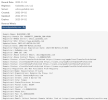- Impact
- 1,389
This is an interesting case, especially because it was a lawsuit filed in the Eastern District of Virginia against 40 domain name owners.
In September 2022, Blackrock, Inc. filed a lawsuit against the owner of balckrock dot com for trademark infringement. They also included 40 other domain names as well:
BALCKROCK.COM, BLACKROCKINVESTMENTS.COM, BLACKROCKINVESTORS.COM, BLACKROCKBANK.COM, BLACKROCKFINANCIALCORP.COM, BLACKROCKMONEY.COM, BLACKROCKEQUITYPARTNER.COM, BLACKROCKFUNDING.COM, BLACKROCKHOLDINGINVESTMENTS.COM, BLACKROCKBANKS.COM, BLACKROCKTRADELLP.COM, BLACKROCK-PSA.COM, BLACKROCK-INVESTMENT.COM, BLACKROCKBITCOIN.COM, BLACKROCKUKINVESTMENT.COM, BLACKROCKCAPITALSOLUTIONSLLC.COM, BLOCKROCKCAPITAL.COM, BLACKROCK-FUND.COM, BLACKROCKCRYPTOBANK.COM, BLACKROCKBROKER.COM, BLACKROCKBROKERAGEFIRM.COM, BLACROCK.NET, MYBLACKROCKISHARES.COM, BLACK-ROCK-INVEST.COM, BLACKROCKINVESTMENTSGROUP.COM, BLACKSOCK-INVEST.COM, FUNDBLACKROCK.COM, BLACKROCKFINANCIALADVISERS.COM, BLACKROCKFINANCIALADVISORS.COM, BLACKROCKLOAN.COM, BLACKROCK-STOCK.COM, BLACKROCKE.COM, BLACKROCKDIGITALASSETS.COM, BLACKROCKINVEST.ORG, BLACKRPCK.COM, BLACKROCK-INVEST.COM, BLACKROK.COM, BLACKROCKGLOBALINVESTMENT.COM and BLACKROCKVESTMENT.COM
https://dockets.justia.com/docket/virginia/vaedce/1:2022cv01002/528315
Rather than filing a UDRP, they chose to file a lawsuit in Virginia. Blackrock, Inc. won the case, and it was finalized by the judge in December 2022.
What's interesting to me here is that GoDaddy, the registrar where at least 1 of the domain names were registered, at NO time during the lawsuit (when they were told to lock the domains), nor when the domains were moved out of the domain owner's account, did GoDaddy notify the domain owners.
I know one of the owners of the domains, and they were actually using it for a website that had nothing to do with finance, investment, etc. so it's quite possible that if they had known about the lawsuit they could have tried to defend the ownership of the domain.
The UDRP process notifies domain owners about the UDRP and gives them a chance to respond. However, if a lawsuit is filed, then domain owners are not notified at all. In this case, the domain owner went to renew the domain and found it was no longer in his GoDaddy account, so they came to me (through DNAccess' domain recovery service) and asked if I could find out what happened.
So what are domain owners to do? We're not notified when a lawsuit is filed, especially if the domain is at GoDaddy and it's locked.
In September 2022, Blackrock, Inc. filed a lawsuit against the owner of balckrock dot com for trademark infringement. They also included 40 other domain names as well:
BALCKROCK.COM, BLACKROCKINVESTMENTS.COM, BLACKROCKINVESTORS.COM, BLACKROCKBANK.COM, BLACKROCKFINANCIALCORP.COM, BLACKROCKMONEY.COM, BLACKROCKEQUITYPARTNER.COM, BLACKROCKFUNDING.COM, BLACKROCKHOLDINGINVESTMENTS.COM, BLACKROCKBANKS.COM, BLACKROCKTRADELLP.COM, BLACKROCK-PSA.COM, BLACKROCK-INVESTMENT.COM, BLACKROCKBITCOIN.COM, BLACKROCKUKINVESTMENT.COM, BLACKROCKCAPITALSOLUTIONSLLC.COM, BLOCKROCKCAPITAL.COM, BLACKROCK-FUND.COM, BLACKROCKCRYPTOBANK.COM, BLACKROCKBROKER.COM, BLACKROCKBROKERAGEFIRM.COM, BLACROCK.NET, MYBLACKROCKISHARES.COM, BLACK-ROCK-INVEST.COM, BLACKROCKINVESTMENTSGROUP.COM, BLACKSOCK-INVEST.COM, FUNDBLACKROCK.COM, BLACKROCKFINANCIALADVISERS.COM, BLACKROCKFINANCIALADVISORS.COM, BLACKROCKLOAN.COM, BLACKROCK-STOCK.COM, BLACKROCKE.COM, BLACKROCKDIGITALASSETS.COM, BLACKROCKINVEST.ORG, BLACKRPCK.COM, BLACKROCK-INVEST.COM, BLACKROK.COM, BLACKROCKGLOBALINVESTMENT.COM and BLACKROCKVESTMENT.COM
https://dockets.justia.com/docket/virginia/vaedce/1:2022cv01002/528315
Rather than filing a UDRP, they chose to file a lawsuit in Virginia. Blackrock, Inc. won the case, and it was finalized by the judge in December 2022.
What's interesting to me here is that GoDaddy, the registrar where at least 1 of the domain names were registered, at NO time during the lawsuit (when they were told to lock the domains), nor when the domains were moved out of the domain owner's account, did GoDaddy notify the domain owners.
I know one of the owners of the domains, and they were actually using it for a website that had nothing to do with finance, investment, etc. so it's quite possible that if they had known about the lawsuit they could have tried to defend the ownership of the domain.
The UDRP process notifies domain owners about the UDRP and gives them a chance to respond. However, if a lawsuit is filed, then domain owners are not notified at all. In this case, the domain owner went to renew the domain and found it was no longer in his GoDaddy account, so they came to me (through DNAccess' domain recovery service) and asked if I could find out what happened.
So what are domain owners to do? We're not notified when a lawsuit is filed, especially if the domain is at GoDaddy and it's locked.
Last edited:








